
NetSuite vs Salesforce: in-depth comparison & selection guidelines
May 23, 2024
- Home
- ERP services
- NetSuite vs Salesforce

Head of Salesforce Practice
- While Salesforce can be described as a traditional CRM system, NetSuite is an enterprise resource planning suite by Oracle combining CRM and ERP capabilities.
- Both providers deliver their CRM products using the software-as-a-service (SaaS) model.
- Users can access both CRM solutions via a browser or respective mobile apps.
Let us compare the two solutions with a focus on their functionality, customization opportunities, integration possibilities, and pricing models. We also share some selection tips and recommendations from our NetSuite experts and Salesforce specialists.
NetSuite vs Salesforce by CRM functionality
Both NetSuite and Salesforce split their CRM service offerings into multiple feature-rich solutions (or “Clouds”, in Salesforce terminology) covering key aspects of customer relationship management. The following overview will focus on the solutions and respective features related to the three main pillars of CRM, namely marketing, sales, and customer service, while briefly mentioning other valuable CRM capabilities for comprehensiveness.
Key marketing features
NetSuite Marketing Automation
- Marketing Automation
Automating various marketing activities, including creating new lead, prospect, or customer records based on submitted entry forms, generating emails via customized templates, and scheduling multi-channel marketing campaigns. - Campaign Management
Analyzing demographics, purchase trends, and response patterns to segment your audience and launch targeted marketing campaigns, including personalized email communications. - Landing Pages & Forms
Automatically routing prospects from landing page forms to a suitable salesperson while providing the latter with the collected personal data to maximize the conversion rate. - Lead Reporting & Analytics
Monitoring the ROI of your marketing initiatives to identify which campaigns generate more leads and revenue and tracking the touchpoints involved in the lead conversion process.
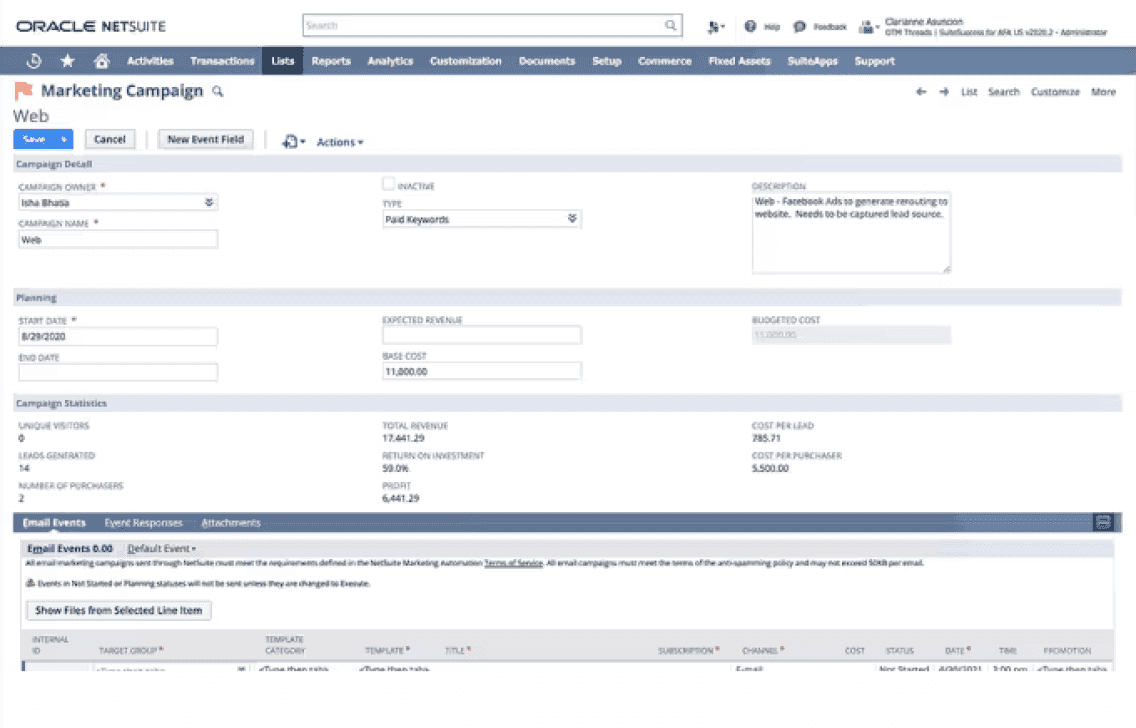
Image title: NetSuite Marketing Campaign dashboard
Image source: netsuite.com — NetSuite Marketing Automation
Salesforce Marketing Cloud
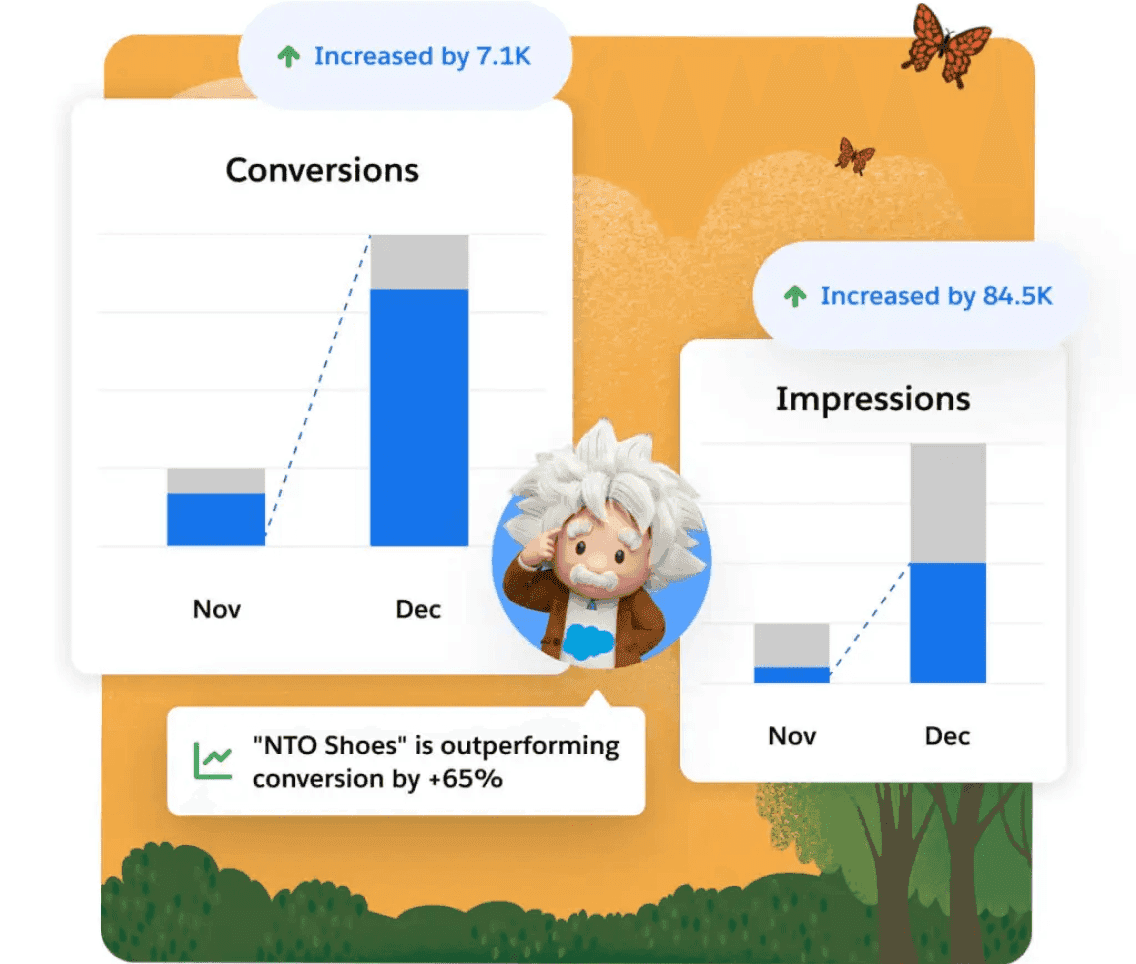
Image title: Salesforce Marketing Insights dashboard
Image source: salesforce.com — Marketing Cloud Intelligence
- Lead Generation
Creating landing pages or forms via drag-and-drop features and performing lead segmentation to enable targeted marketing. - Media Planning & Pacing Optimization
Optimizing media plans, including budgeting and pacing, with the help of AI for pacing calculations, tracking campaign performance, and scenario simulations. - Email Studio
Enhancing email marketing campaigns with personalized messages triggered by subscribers’ actions. - Einstein Web Recommendations
Providing website visitors with personalized content based on their preference profiles and your business rules. - AI-Driven Journey Triggers
Personalizing buying journeys in real time with offers and other automated interactions triggered by customer behavior. - Einstein Marketing Insights
Tracking marketing KPIs, such as the average time spent on your website, and identifying factors impacting marketing performance. - Einstein Engagement Scoring
Predicting the likelihood of customer engagement with your marketing content, such as opening an email or interacting with push notifications. - Centralized Program Management
Using industry-specific templates to create B2B and B2C loyalty programs for different customer segments.
Key sales features
NetSuite Sales Force Automation
- Opportunity Management
Creating opportunity records with deal details, including items of interest to your prospect or customer, anticipated order value, and previous communications, to keep track of all opportunities in the pipeline and organize sales activities. - Quote Management
Automatically applying pricing rules, discounts, taxes, and shipping rates to generate quotes, converting quotes into sales orders, and highlighting upselling opportunities based on buying pattern analysis. - Sales Forecasting
Analyzing pending opportunities, quotes, and orders to estimate the likelihood of closing a deal and meeting sales quotas, helping sales reps optimize their strategies accordingly. - Incentive Compensation Management
Establishing commission plans and related parameters, such as quota or product profitability, and calculating compensations for your sales teams, along with indirect commissions for managers and executives. - Contract Renewals
Automating contract renewals to facilitate recurring billing operations, managing discounts, and tracking renewal revenues and upsells. - Intelligent Item Recommendations
Providing ecommerce platform visitors with AI-based personalized product suggestions according to their individual purchase patterns and the overall buying behavior of your customer base.
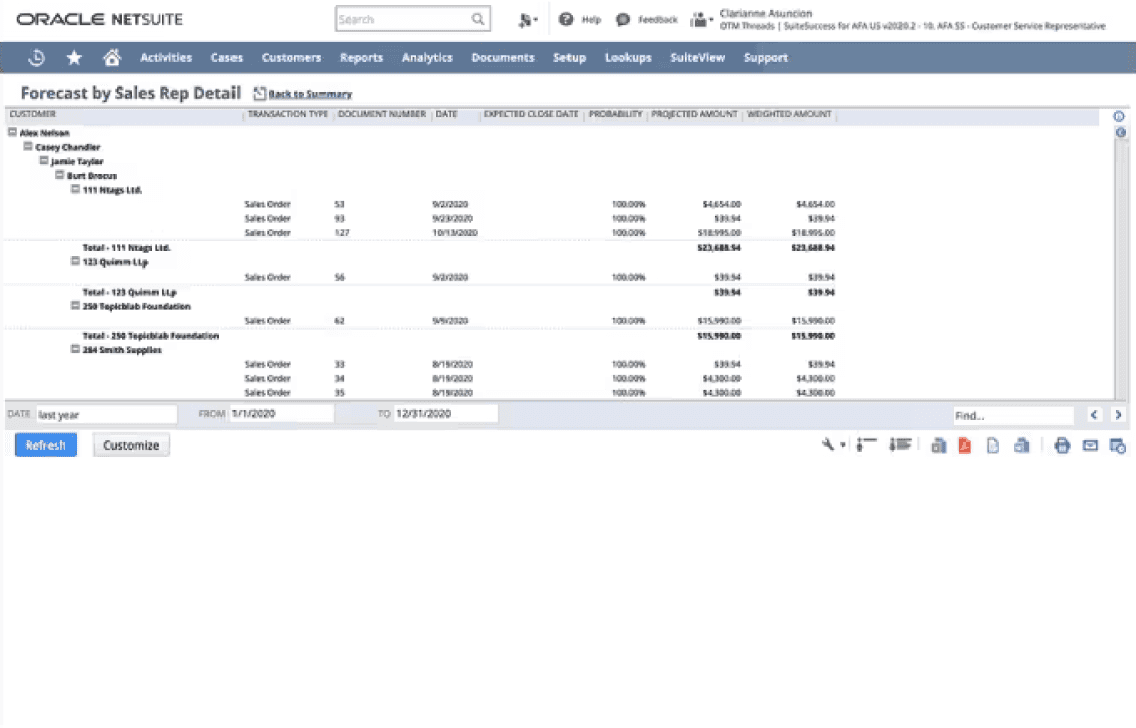
Image title: NetSuite Sales Forecasting dashboard
Image source: netsuite.com — NetSuite Sales Force Automation
Salesforce Sales Cloud
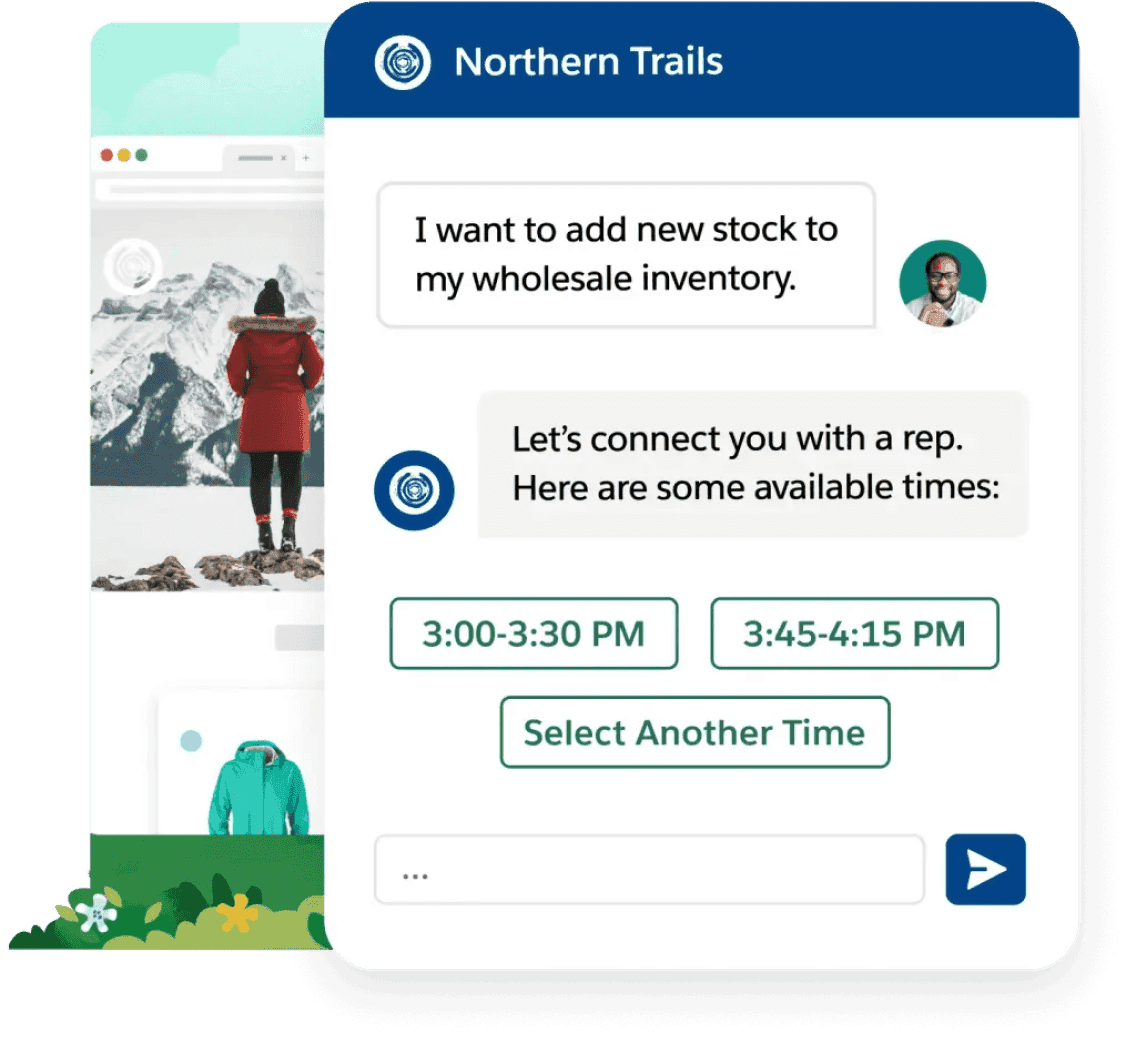
Image title: Salesforce Buyer Assistant’s web chat interaction
Image source: salesforce.com — Sales AI
- Accounts & Contacts
Storing customer data in business and personal accounts and facilitating contact management. - Opportunity & Lead Scoring
Automatically estimating the likelihood of closing an opportunity and converting a lead, helping sales teams focus on high-value ones. - Einstein Generative AI for Sales
Automatically generating personalized emails for your contacts and leads based on sales data. - Buyer Assistant
Implementing a virtual assistant into your website to engage with leads, instantly qualify and route them to available reps, as well as schedule customer meetings for sales teams. - Customer Signals
Monitoring customer interactions and identifying common conversation trends to optimize your sales programs. - Engagement Intelligence
Receiving AI-powered recommendations on the best next action to engage prospects based on the insights from previous emails and calls. - Email Productivity Tools
Streamlining email communications with customers and prospects via email templates, follow-up notifications, and a meeting scheduling system integrated with a sellers’ calendar applications. - Configure, Price, Quote
Generating accurate quotes for customized products and services according to features selected, quantities, and discounts. - Insights & Dashboards
Tracking sales team performance, including closed deals and win rate, via built-in dashboards and identifying cross-selling and upselling opportunities with whitespace analysis.
Key customer service features
NetSuite Customer Service Management
- Case Management
Routing and managing customer support cases from multiple channels (email, phone, etc.), tracking cases by type, product, or other parameters, and monitoring service metrics like call volumes and resolution times. - Customer Portal
Allowing customers to submit support requests, track orders, pay invoices, and communicate with your company via the self-service features on web portals. - Knowledge Management
Building and managing a knowledge base that enables service reps to easily find and access support articles, training videos, or other content for faster case resolution.
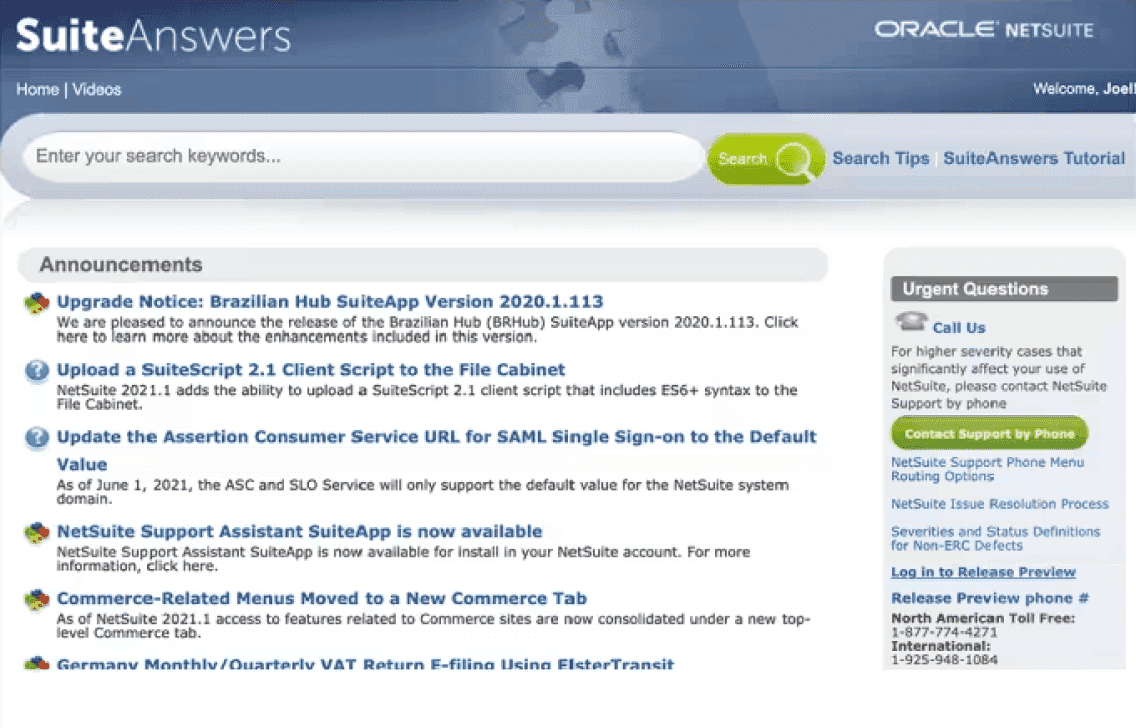
Image title: NetSuite Knowledge Management center
Image source: netsuite.com — NetSuite Customer Service Management
Salesforce Service Cloud
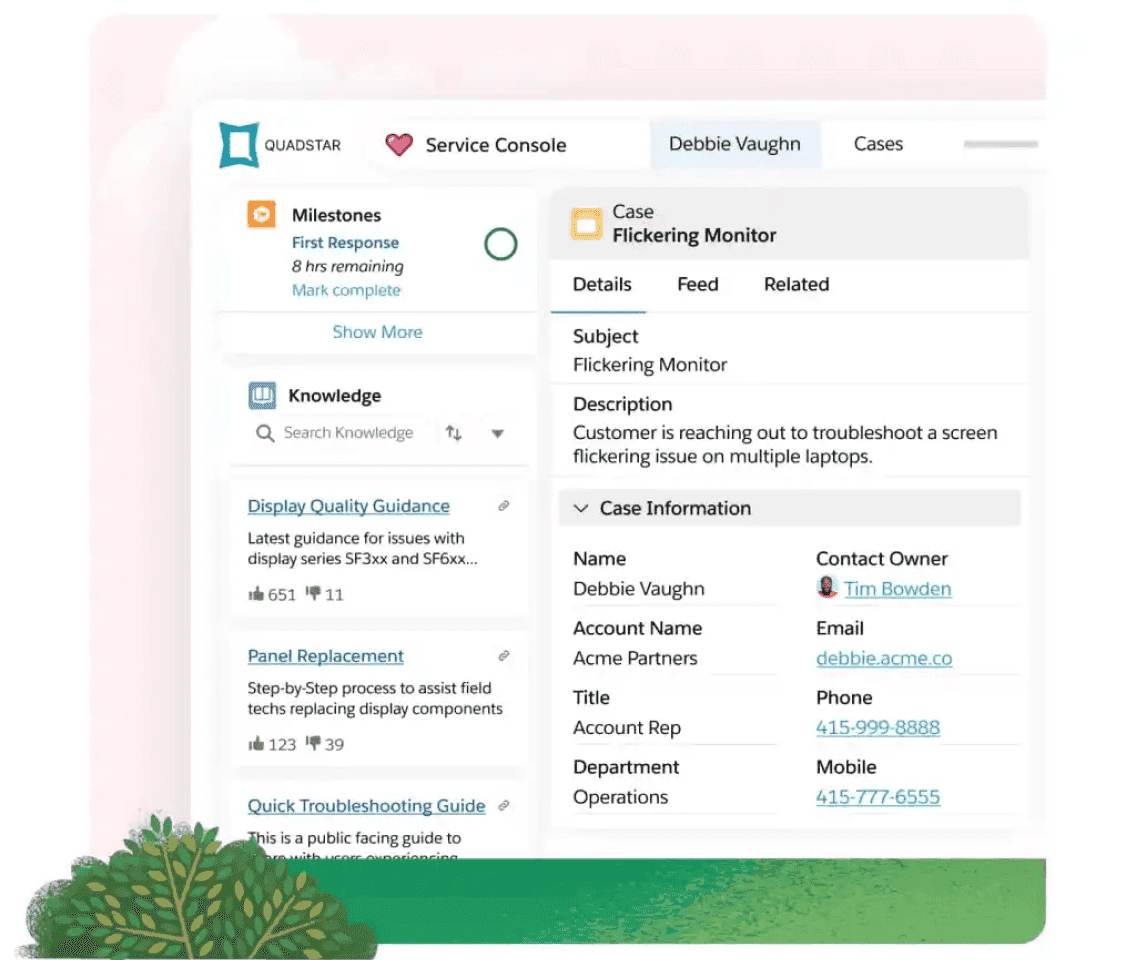
Image title: Salesforce Case Management’s service console
Image source: salesforce.com — Agent & Mobile Worker Productivity
- Case Management
Automatically distributing cases to your service teams and providing your specialists with relevant customer and case information for faster resolution. - Einstein Bots
Deploying multilingual, easily configurable chatbots across your communication channels to handle routine requests. - Einstein Article Recommendations
Providing support specialists with relevant knowledge base articles to address clients’ requests more effectively. - Einstein Conversation Mining
Analyzing previous customer interactions to find out why clients reach out to your contact center and identify recurring cases. - Service Performance Dashboards
Monitoring key service metrics like customer satisfaction score or average time to close and assessing case routing efficiency and agent performance.
Other noteworthy CRM capabilities
- Partner Relationship Management
Coordinating marketing and sales efforts like joint marketing campaigns with partners, tracking partner performance, sharing relevant information with your partner network, and calculating commissions and royalties. - Configure, Price, Quote (CPQ)
Configuring products or services according to customer needs, calculating the price based on the features selected, and automatically generating sales proposals, bills of materials, and work orders.
- Commerce Cloud
Setting up digital storefronts via built-in templates, augmenting them with AI to personalize the customer experience and automate tasks (such as creating product descriptions), and tracking sales performance via merchant dashboards. - Industry-specific Clouds & Services
Accessing industry-oriented features via dedicated products, such as Education Cloud to manage student admissions, Manufacturing Cloud to streamline warranty lifecycle management, and Financial Services to facilitate mortgage and lending operations. - Community Cloud
Creating branded communities and portals that enable customers to connect with your company, streamline sales operations with resellers, distributors, or partners, and foster employee collaboration.
Summing up
Oracle NetSuite and Salesforce boast a remarkable range of CRM-oriented products and features. Their service offerings partially overlap, as they share some capabilities in terms of lead management, sales force automation, case management, and partner collaboration. However, Salesforce’s CRM functionality is more extensive and granular, with a plethora of highly specialized features whose roundup above represents just a small selection. What is more, Salesforce has a comprehensive AppExchange marketplace, offering both free and paid extension packages, including those for integrations, which extends the capabilities of the Salesforce platform and streamlines its implementation. Therefore, organizations looking for a comprehensive CRM solution may find Salesforce a more suitable choice.
While NetSuite certainly integrates AI-powered automation and data analytics capabilities, it can hardly compete with Salesforce and its embedded artificial intelligence platform Einstein. Salesforce is constantly expanding its range of AI-powered CRM services with new functionalities, including the recent addition of Einstein Copilot, a generative AI-enabled conversational assistant. This makes Salesforce an ideal option for companies interested in smart automation and advanced analytics.
Implement your CRM solution with Itransition’s guidance
NetSuite vs Salesforce by non-CRM functionality
The different natures of NetSuite (a comprehensive ERP suite equipped with a CRM module) and Salesforce (a specialized CRM system) result in a stark contrast between their non-CRM capabilities.
This suite includes a wide set of modules to manage multiple business functions beyond marketing, sales, and customer support:
- Financial Management modules
Managing finance and accounting tasks, such as budgeting and expense allocation, billing and invoicing, revenue forecasting, accounts payable processing, and reconciliation. - Professional Services Automation modules
Facilitating project management, including budgeting, task assignment, scheduling, resource allocation, invoicing, and reporting. - Human Resources modules
Helping your HR specialists with attendance monitoring, payroll management, and shift scheduling. - Supply Chain modules
Streamlining supply chain management (SCM) and warehouse management operations, including requisitioning and purchasing, shelf-life tracking, and warehouse activity monitoring via dashboards. - Inventory & Order Management modules
Enabling multi-location inventory management and demand-based inventory replenishment while facilitating order entry, allocation, and execution. - Commerce modules
Setting up ecommerce sites integrated with other modules and tracking inventory and customer information.
Salesforce CRM’s function coverage focuses on customer-oriented operations. Salesforce adopters requiring functionality beyond customer relationship management can consider these two options:
- Integrating Salesforce with off-the-shelf or custom ERP systems, accounting software, supply chain management tools, HRMSs, and other solutions (see the following section on integrations).
- Complementing Salesforce with solutions built on top of the Salesforce Platform (Salesforce’s PaaS service), which can be found on Salesforce’s official marketplace known as AppExchange. For instance, Certinia ERP Cloud is a popular Salesforce-based ERP software solution on AppExchange.
Summing up
Given its combination of ERP and CRM capabilities, NetSuite can be the right choice for businesses in need of a more comprehensive enterprise software solution.
Businesses with comprehensive ERP solutions looking to expand their software ecosystem with a more customer-focused tool should consider adopting Salesforce.
NetSuite vs Salesforce by customization possibilities
Netsuite and Salesforce adopters can customize the respective platform functionality to their specific business requirements.
Oracle Netsuite offers various customization tools:
- SuiteBuilder
An intuitive tool to create custom fields, form layouts, record types, and other features via a point-and-click interface. - SuiteFlow
A visual tool focusing on workflow customization, including multistage business processes like transaction approval and lead nurturing. - SuiteScript
A JavaScript-based platform to customize your interfaces, dashboard portlets, business logic, and other elements via scripts. While these scripts are more complex, they provide more control compared to point-and-click tools. - SuiteApp
NetSuite’s marketplace offering numerous off-the-shelf applications to extend and modify your functionality.
Salesforce’s customization capabilities rival those of NetSuite in terms of variety and user-friendliness:
- Declarative tools
A set of tools for no-code customizations (Custom Objects, Layouts, Lightning record pages, Flows, Approval processes) - Lightning Platform
An entire suite of services and developer tools (LWC, Aura, Apex) for creating custom applications, integrations, and functionality. - AppExchange
Easy to install, point-and-click extension packages for additional functionality and third party integrations.
Summing up
While Salesforce is generally considered the most flexible platform in terms of customization, both systems offer no-code, user-friendly methods to modify their functionality.
NetSuite vs Salesforce by integration capabilities
Integrating NetSuite or Salesforce with other corporate systems or third-party services enables seamless data exchange and turns your CRM solution into a single source of truth.
NetSuite’s integration methods include:
- SuiteCloud Platform Integration
A range of industry-standards-based integration solutions, including REST and SOAP APIs, to connect NetSuite with other applications. - NetSuite Connector
A commerce-oriented tool to integrate NetSuite with ecommerce storefronts, POS systems, and logistics solutions via pre-built integrations. - SuiteApp
A comprehensive range of ready-to-use integrations created by NetSuite’s partners and distributed via its marketplace.
You can integrate Salesforce with other solutions via:
- AppExchange
A vast choice of off-the-shelf integrations with additional third-party tools available on this marketplace. - MuleSoft
Salesforce’s integration platform enabling users to build APIs and access a library of pre-built connectors for seamless integration with dozens of systems and services (SAP, NetSuite, Workday, AWS, LinkedIn, Gmail, etc.). - Data Cloud
A data integration platform designed to ingest streams of data from multiple sources in real-time via out-of-the-box connectors, especially useful for AI and data analytics purposes.
Summing up
NetSuite lacks some of the native integrations with popular business tools offered by Salesforce. For instance, email integration between NetSuite and Outlook requires third-party integrations, while Salesforce provides its own add-in for this purpose.
Unlike Salesforce, NetSuite CRM is already part of a larger ERP ecosystem whose modules are natively integrated with each other.
NetSuite vs Salesforce by pricing
When it comes to licensing and pricing, NetSuite and Salesforce follow two somewhat different approaches.
- An annual fee according to the edition, number of users, and optional modules
- Modules can be licensed separately at any time during the contract
- Price upon request
- Multiple tiered plans for each Cloud with prices available on the Salesforce website
- Billed annually, except for specific starter plans (monthly or annually)
- 30-day free trial
Summing up
Netsuite’s undisclosed pricing can be a blocker for companies prioritizing transparency, as they’ll need to contact the provider to get a quote.
Salesforce offers some budget-friendly starter packages. For instance, the Starter Suite with basic marketing, sales, and service functionality will cost you $25 per user per month. However, costs can easily snowball as you add more capabilities.
Our CRM services
With its comprehensive expertise in major CRM platforms like Netsuite and Salesforce, Itransition can help organizations select the most suitable solution for their business needs and implement it into their software ecosystem.

Consulting
- Audit of your current CRM software, if any
- Definition of functional and non-functional requirements
- Platform, module, and pricing plan selection
- Implementation roadmapping and budgeting
- Configuration and customization consulting
- Integration and migration advisory
- User training and support
Implementation
- Platform configuration and customization
- Integration with your software ecosystem
- QA and user acceptance testing
- Deployment to the company’s environment
- Data migration from your legacy CRM system to the new platform
Rely on Itransition for seamless CRM adoption
A tough choice between leading CRM providers
Both NetSuite and Salesforce offer remarkable feature sets, provide multiple customization options, and can be easily integrated with plenty of third-party systems and services. That said, their functional peculiarities and, even more so, their rather different nature make them at odds. Gathering feedback from adopters via peer-to-peer review sites like G2, Capterra, or Gartner can help you understand the pros and cons of NetSuite and Salesforce. Still, such opinions aren't always consistent across the user base. For instance, users of both platforms are evenly split between those who appreciate their ease of use and those who criticize their steep learning curve. To make a sound choice, you should ask for expert advice, and Itransition is ready to support you in this endeavor.

Service
Salesforce consulting services
Comprehensive Salesforce consulting services from certified experts to help you implement an effective Salesforce-based solution or enhance the existing one.

Case study
Salesforce CRM implementation for a real estate company
Learn about Salesforce CRM implementation that helped a large real estate company increase their sales by 15% and shorten their sales cycle by 10%.

Insights
Enterprise CRM: key features, top platforms & guidelines
Discover distinctive elements, key features, and benefits of enterprise CRM software, along with top platforms and criteria for choosing the most suitable one.

Service
CRM services: our expertise & tailored solutions
Itransition provides CRM services to help you implement a tailored CRM solution or enhance an existing one, strengthen customer relationships, and drive sales.

Insights
CRM strategy: key steps, guidelines & payoffs
Explore key steps and best practices to define, implement, and further enhance your CRM strategy for stronger customer loyalty and measurable business benefits.
More about ERP services
Services
Platforms
Industries